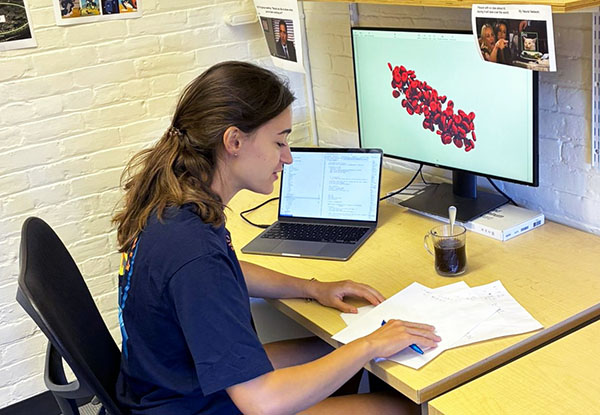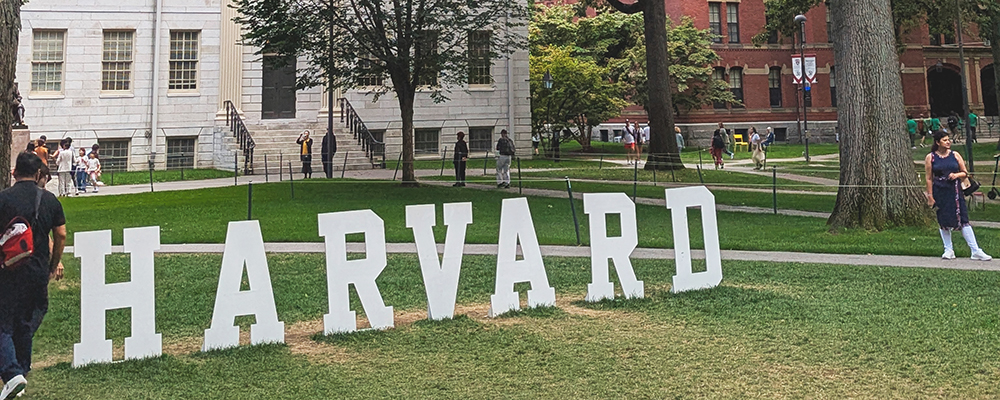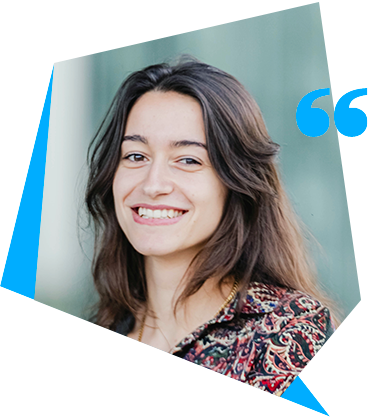< back to articles
5-month research internship for Laura
Published on
As a student at ISAE-SUPAERO in the Aerodynamics, Energetics and Propulsion Department (DAEP), Laura CHOQUET gradually oriented her studies towardsartificial intelligence applied to fluid mechanics. For her internship, she was able to gain international experience by spending 5 months in Boston.
She shares her experience with you!

Why Harvard University and the United States?
As a student at ISAE-SUPAERO in the research section of the Aerodynamics, Energetics and Propulsion (DAEP) department, I gradually oriented my studies towards artificial intelligence applied to fluid mechanics. During my gap year, I enrolled in the Maths, Vision and Learning (MVA) Master’s program at ENS Paris-Saclay, a top-class artificial intelligence course with a strong emphasis on initiation to research. This choice fitted in perfectly with my academic project and gave me the impetus to seek research experience abroad, in order to validate both the master’s degree and my academic mobility required for my engineering diploma.
It was against this backdrop that Michaël Bauerheim, DAEP professor and lecturer at ISAE-SUPAERO, contacted Petros Koumoutsakos, a highly regarded Harvard professor and pioneer in the use of artificial intelligence for fluid mechanics simulations. What started out as a simple e-mail with no great expectations turned into a real internship opportunity.
Being immersed for five months in a Harvard laboratory, in contact with an international team of researchers, was an incredible experience for me. I wanted to discover the reality of research in such an environment: to understand the internal dynamics of a large lab, to see how collaborations are structured, and above all to exchange ideas with researchers who are experts in their field.
I was also very curious to discover the United States and to see how I’d cope with leaving completely on my own, in a city I didn’t know at all, for five months without going home to see my family. It was a real personal challenge for me: I wanted to test my ability to adapt, to see how I would react to the unknown, and above all I wanted to get out of my comfort zone.

What did you take away from your stay and your immersion?
Laura CHOQUET

My stay in Boston was extremely enriching, a real break in my career. I learned a lot, academically, personally and linguistically.
Before leaving, I had a few questions about the level expected of an intern at Harvard, and about the intensity of the work required. To maximize my immersion, I chose to
On site, my colleagues were immediately very accessible and warm. We often have a rather intimidating image of researchers at a prestigious university like Harvard, but as I got to know them on a daily basis, I quickly realized that they also shared the doubts, uncertainties and sometimes difficulties of their research work. On the other hand, the way the laboratory functioned was very different from what I’d experienced at DAEP: a more pyramidal hierarchy, greater pressure linked to funding, and clear expectations in terms of results.
As soon as I arrived, all the members of the group presented their work to me, answering my questions in great detail. Their research focused on the use of artificial intelligence algorithms to accelerate fluid mechanics simulations, on both small and large scales, notably through the use of Reinforcement Learning, diffusion models or Transformers.
My local supervisor, Lucas Amoudruz, had developed a computational software tool dedicated to micro-fluidic interactions during his thesis with his laboratory. This tool enabled us to model with great precision the
More specifically, I have been working on the use ofreinforcement learning to optimize the control of micro-swimmers, i.e. tiny devices capable of moving through blood vessels by being propelled by a rotating magnetic field. These micro-robots represent a
Thanks to the help of Lucas, who had designed a challenging and well thought-out internship topic, I felt fully involved in the research project. I was able to develop
This autonomy taught me to persevere, particularly during a period when my code didn’t work for several weeks. Rather than give up, I tried to investigate methodically, to understand where the error was coming from, and I discovered how integral this process was to the work of a researcher. I also realized that it was just as important to go into the technical details as it was to be able to stand back, put our results into a more global perspective and question the relevance of our approaches after several weeks’ work.
What has marked you on a personal level?
Boston is a student city: between Harvard and MIT, it attracts a very diverse international community. I met many of my fellow interns, as well as doctoral and post-doctoral students from Europe, Asia and Latin America. Their accounts of their academic careers and career choices have been a great help to me in thinking about my own future. Even if I haven’t made up my mind yet, these exchanges have reinforced my idea of doing my thesis in Europe.
I made the effort to reach out to others, to ask questions about their backgrounds, their doubts and their vision of the academic system. These discussions opened my eyes to very varied trajectories, sometimes far removed from my own. I was also happy to meet people who hadn’t gone through the “preparatory class and engineering school” pattern I knew so well: it gave me another perspective on the different ways of getting into research.
I adapted fairly quickly to American life, to the city’s dynamism and pace. But by the end of my stay, I felt I didn’t quite fit in. In contrast, this trip made me love France, its cities and its culture even more. Living abroad is a real eye-opener: you learn to detach yourself from your habits, to see things differently, and above all to put into perspective what you thought was obvious.
And what about language?
Working in an international environment helped me to improve my English enormously. My colleagues came from all over the world, sometimes with very different accents, and this forced me to adapt quickly. Today, I feel much more at ease when speaking and I understand English better than before. Living with students of different nationalities, including an American, was also a very rich human experience. I enjoyed listening to their often inspiring stories, and sharing simple but pleasant moments in their daily lives.
What are the most memorable moments in your life?
There were many highlights: my trips to the East Coast, with the excessiveness of New York and the extravagance of Miami. I was also the driving force behind my lab’s participation in an inter-lab beach volleyball tournament at Harvard, a convivial experience that strengthened bonds within the team in a completely different setting. Finally, one of the highlights was when the director of my lab decided that my work deserved to be published in a scientific journal: this was a real recognition of the value of my work.
What did you gain from your stay and what are your prospects for the future?
This internship has consolidated my desire to stay close to research, whether in a company or in academia. I’m naturally leaning towards a thesis, but I’d also like to discover the world of corporate R&D before making a final decision. This experience has enabled me tobroaden my academic network, to work with internationally recognized researchers and to benefit from the support of a particularly influential laboratory director , whose backing could be decisive in my future endeavors.
My supervisors’ feedback on my work has been very positive, which I hope will pave the way for other ISAE-SUPAERO students interested in a research experience at Harvard. Beyond the personal experience, I believe that this type of internship helps to strengthen the links between ISAE-SUPAERO and leading research laboratories, which is beneficial for both the school and its students.
The trip made me want to immerse myself in Europe even more and discover more, and it also made me much more confident about the idea of working abroad again.
A final word to our donors?
I would like to sincerely thank the donors of the Fondation ISAE-SUPAERO for the support they give to our students. Thanks to them, it is possible to live extraordinary experiences, which leave a deep and indelible mark on the personal and academic development of a young adult.